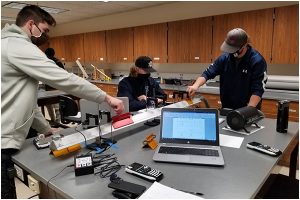16 Jan DSU’s Department of Natural Sciences adjusts and thrives during the pandemic
 Written by Dr. Craig Whippo, co-chair of the Department of Natural Sciences and associate professor of biology at DSU
Written by Dr. Craig Whippo, co-chair of the Department of Natural Sciences and associate professor of biology at DSU
The beginning of a new year is often a time to look back as well as look forward. As 2021 begins, the students and faculty of the Department of Natural Sciences at Dickinson State University (DSU) have many accomplishments to acknowledge and celebrate. Even in the midst of a global pandemic, we have continued to innovate, create a supportive educational community, and provide access to scientific expertise and resources.
Dr. Eric Brevik and I adopted free open education resources (OER) or low-cost textbooks into our curriculum. Adoption of these resources improves accessibility and lowers the cost for students. Many students do not purchase traditional textbooks because, on average, a college textbook costs more than $200. If every professor adopted OER or low-cost textbooks, the savings to students would be almost equivalent in value to one year of tuition at DSU. The widespread adoption of OER and low-cost textbooks is a necessary step for improving accessibility to higher education opportunities.
Due to the pandemic, every faculty member in the department worked diligently to support and guide students who needed to attend classes remotely. Drs. Eric Brevik, Elizabeth Freedman and Joshua Steffan had been recording lectures and posting the recordings online for several years before the pandemic started. Their expertise with lecture-capturing technology provided other faculty in the department a way to keep students on track during the pandemic. Faculty in the department also experimented with synchronous delivery options using programs such as Blackboard Collaborate and Zoom.
The most challenging aspect of the pandemic has been the delivery of Natural Sciences’ laboratory courses. The department made an effort to continue face-to-face instruction in labs as much as possible because it provides for the best educational experience. When accommodations were needed, the department sought alternative options to the traditional instruction method. To provide a resemblance of the laboratory experience, some faculty used online virtual science labs. These virtual labs provide students with a simulation of the experience of a hands-on laboratory activity and allow the students to reinforce key concepts. Other faculty developed a set of simple experiments that students could perform on their own using common household items. In my botany class, lab students worked on a place-based botany project that they could do at home.
As we navigate through this pandemic, enrollment in the science programs at DSU has increased, and the total number of student credit hours generated is also growing. DSU’s students appreciate the University’s commitment to providing high quality education through any troubling time. We look forward to the post-pandemic world, but throughout this pandemic, the faculty and students in the Department of Natural Sciences have risen to the occasion.


